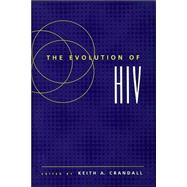
The Evolution of HIV
by Crandall, Keith A.Buy New
Rent Textbook
Used Textbook
We're Sorry
Sold Out
eTextbook
We're Sorry
Not Available
How Marketplace Works:
- This item is offered by an independent seller and not shipped from our warehouse
- Item details like edition and cover design may differ from our description; see seller's comments before ordering.
- Sellers much confirm and ship within two business days; otherwise, the order will be cancelled and refunded.
- Marketplace purchases cannot be returned to eCampus.com. Contact the seller directly for inquiries; if no response within two days, contact customer service.
- Additional shipping costs apply to Marketplace purchases. Review shipping costs at checkout.
Summary
Author Biography
Keith A. Crandall is assistant professor of zoology at Brigham Young University.
Table of Contents
| Contributors | |
| Preface | |
| Introduction to HIV | |
| Molecular Biology of HIV | p. 3 |
| Global Diversity in HIV | p. 41 |
| Molecular Methods for Studying HIV Diversity | |
| Phylogenetics and the Study of HIV | p. 105 |
| Modeling the Molecular Evolution of HIV Sequences | p. 122 |
| Statistical Approaches to Detecting Recombination | p. 153 |
| The Molecular Population Dynamics of HIV-1 | p. 177 |
| Use of Phylogenetic Inference to Test an HIV Transmission Hypothesis | p. 208 |
| Coalescent Approaches to HIV Population Genetics | p. 233 |
| Case Studies of HIV Evolution | |
| Levels of Diversity within and among Host Individuals | p. 275 |
| The Phylogenetics of Known Transmission Histories | p. 315 |
| HIV Evolution and Disease Progression via Longitudinal Studies | p. 346 |
| Perinatal HIV Infection | p. 390 |
| Determinants of HIV-1 Protein Evolution | p. 432 |
| Evolution of HIV-1 Resistance to Antiviral Agents | p. 469 |
| Index | p. 491 |
| Table of Contents provided by Blackwell. All Rights Reserved. |
An electronic version of this book is available through VitalSource.
This book is viewable on PC, Mac, iPhone, iPad, iPod Touch, and most smartphones.
By purchasing, you will be able to view this book online, as well as download it, for the chosen number of days.
Digital License
You are licensing a digital product for a set duration. Durations are set forth in the product description, with "Lifetime" typically meaning five (5) years of online access and permanent download to a supported device. All licenses are non-transferable.
More details can be found here.
A downloadable version of this book is available through the eCampus Reader or compatible Adobe readers.
Applications are available on iOS, Android, PC, Mac, and Windows Mobile platforms.
Please view the compatibility matrix prior to purchase.
